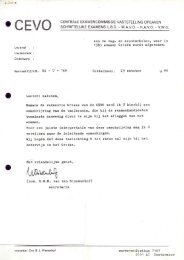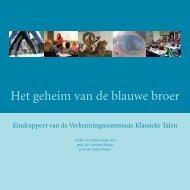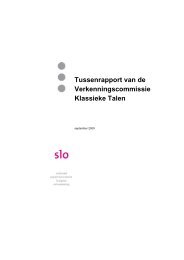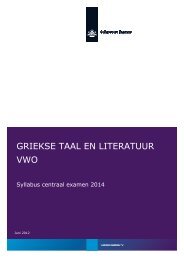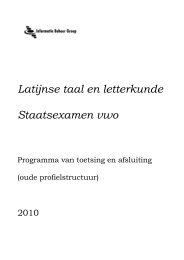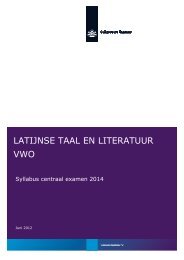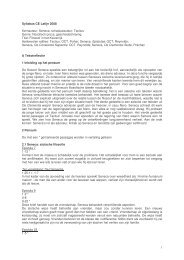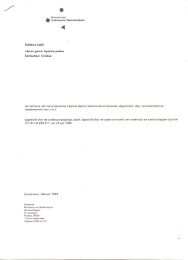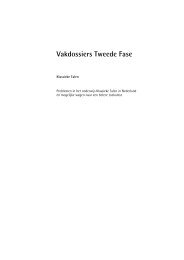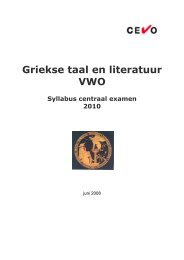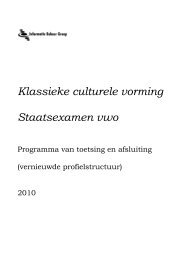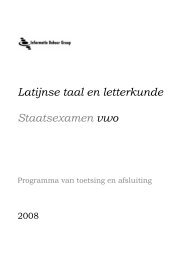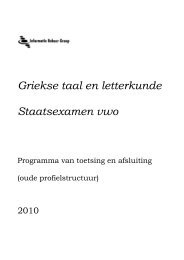Rome Wasn't Digitized in a Day - Council on Library and Information ...
Rome Wasn't Digitized in a Day - Council on Library and Information ...
Rome Wasn't Digitized in a Day - Council on Library and Information ...
Create successful ePaper yourself
Turn your PDF publications into a flip-book with our unique Google optimized e-Paper software.
53<br />
pr<str<strong>on</strong>g>in</str<strong>on</strong>g>ted publicati<strong>on</strong> is ultimately planned, various databases of textual, lexical, <strong>and</strong> bibliographical<br />
<str<strong>on</strong>g>in</str<strong>on</strong>g>formati<strong>on</strong> will be available <strong>on</strong>l<str<strong>on</strong>g>in</str<strong>on</strong>g>e. Currently a limited versi<strong>on</strong> of the lexic<strong>on</strong> <strong>and</strong> the bibliographical<br />
archives can be searched <strong>on</strong>l<str<strong>on</strong>g>in</str<strong>on</strong>g>e.<br />
The Thesaurae L<str<strong>on</strong>g>in</str<strong>on</strong>g>guae Lat<str<strong>on</strong>g>in</str<strong>on</strong>g>ae (TLL) 155 is work<str<strong>on</strong>g>in</str<strong>on</strong>g>g to produce “the first comprehensive scholarly<br />
dicti<strong>on</strong>ary of ancient Lat<str<strong>on</strong>g>in</str<strong>on</strong>g> from the earliest times down to AD 600.” This work is based <strong>on</strong> an archive<br />
of about 10 milli<strong>on</strong> slips <strong>and</strong> takes <str<strong>on</strong>g>in</str<strong>on</strong>g>to account all surviv<str<strong>on</strong>g>in</str<strong>on</strong>g>g texts. While <str<strong>on</strong>g>in</str<strong>on</strong>g> older texts there is a slip<br />
for every word occurrence, later texts are generally covered by a selecti<strong>on</strong> of “lexicographically<br />
relevant examples.” As Hillen (2007) has expla<str<strong>on</strong>g>in</str<strong>on</strong>g>ed, from around the time of Apuleius until 600 AD,<br />
textual sources have been excerpted by mark<str<strong>on</strong>g>in</str<strong>on</strong>g>g noteworthy usages rather than every usage of the word<br />
(with the excepti<strong>on</strong>s of major texts by August<str<strong>on</strong>g>in</str<strong>on</strong>g>e, Tertullian, <strong>and</strong> Commodian). To speed up work,<br />
Hillen observed that methods must be found to reduce the number of slips that will be given<br />
comprehensive treatment s<str<strong>on</strong>g>in</str<strong>on</strong>g>ce they outnumber the excerpted material by a ratio of 4.5 to 1, <strong>and</strong> that<br />
emphasis must be given to texts that did not c<strong>on</strong>form to grammatical or stylistic norms. In terms of<br />
new digital collecti<strong>on</strong>s, Hillen saw them as hav<str<strong>on</strong>g>in</str<strong>on</strong>g>g some value for the work of the TLL:<br />
The ma<str<strong>on</strong>g>in</str<strong>on</strong>g> value of digital databanks for the work of the Thesaurus cannot, therefore, be a<br />
systematic <str<strong>on</strong>g>in</str<strong>on</strong>g>crease <str<strong>on</strong>g>in</str<strong>on</strong>g> the raw material. Rather, they are useful <str<strong>on</strong>g>in</str<strong>on</strong>g> three specific areas:<br />
reproducti<strong>on</strong>, check<str<strong>on</strong>g>in</str<strong>on</strong>g>g, <strong>and</strong> regulated expansi<strong>on</strong> of our sources (Hillen 2007).<br />
By the end of 2009, the project had reached the end of the letter P, <strong>and</strong> approximately two thirds of the<br />
work had been completed. The TLL has been issued <str<strong>on</strong>g>in</str<strong>on</strong>g> pr<str<strong>on</strong>g>in</str<strong>on</strong>g>t versi<strong>on</strong> <strong>and</strong> also has an electr<strong>on</strong>ic versi<strong>on</strong><br />
that is available by subscripti<strong>on</strong> from DeGruyer/Saur. 156<br />
Similar to the TLL’s plan of c<strong>on</strong>trolled expansi<strong>on</strong> through document<str<strong>on</strong>g>in</str<strong>on</strong>g>g unusual or noteworthy usages<br />
of words, the “Poorly Attested Words <str<strong>on</strong>g>in</str<strong>on</strong>g> Greek” (PAWAG) 157 project based at the University of<br />
Genoa is sett<str<strong>on</strong>g>in</str<strong>on</strong>g>g up an electr<strong>on</strong>ic dicti<strong>on</strong>ary that “gathers together words of Ancient Greek that are<br />
either <strong>on</strong>ly scantily attested (i.e., with <strong>on</strong>e or few occurrences), <str<strong>on</strong>g>in</str<strong>on</strong>g>adequately (i.e., characterized by<br />
some sort of uncerta<str<strong>on</strong>g>in</str<strong>on</strong>g>ty) or <str<strong>on</strong>g>in</str<strong>on</strong>g> any case problematically, both from a formal <strong>and</strong> semantic po<str<strong>on</strong>g>in</str<strong>on</strong>g>t of<br />
view.” This database is <str<strong>on</strong>g>in</str<strong>on</strong>g>tended to supplement traditi<strong>on</strong>al dicti<strong>on</strong>aries that cannot pay sufficient<br />
attenti<strong>on</strong> to the issue of poorly attested words. There are currently 1,548 headwords <str<strong>on</strong>g>in</str<strong>on</strong>g> this database<br />
that can be searched with a str<str<strong>on</strong>g>in</str<strong>on</strong>g>g <str<strong>on</strong>g>in</str<strong>on</strong>g> either Greek or Lat<str<strong>on</strong>g>in</str<strong>on</strong>g>.<br />
A more large-scale endeavor is the Greek Lexic<strong>on</strong> project, 158 which is be<str<strong>on</strong>g>in</str<strong>on</strong>g>g overseen by the Faculty<br />
of Classics at Cambridge University. It plans to release a new Ancient Greek-English lexic<strong>on</strong> of<br />
<str<strong>on</strong>g>in</str<strong>on</strong>g>termediate size that will take <str<strong>on</strong>g>in</str<strong>on</strong>g>to account the most recent scholarship, replace archaic term<str<strong>on</strong>g>in</str<strong>on</strong>g>ology<br />
with up-to-date English, <strong>and</strong> both reexam<str<strong>on</strong>g>in</str<strong>on</strong>g>e orig<str<strong>on</strong>g>in</str<strong>on</strong>g>al source material <strong>and</strong> add new material that has<br />
been discovered s<str<strong>on</strong>g>in</str<strong>on</strong>g>ce the end of the n<str<strong>on</strong>g>in</str<strong>on</strong>g>eteenth century. This project has adopted a semantic method of<br />
organiz<str<strong>on</strong>g>in</str<strong>on</strong>g>g articles <strong>and</strong> plans to publish a pr<str<strong>on</strong>g>in</str<strong>on</strong>g>t editi<strong>on</strong> through Cambridge University press as well as<br />
an <strong>on</strong>l<str<strong>on</strong>g>in</str<strong>on</strong>g>e versi<strong>on</strong> <str<strong>on</strong>g>in</str<strong>on</strong>g> the PDL. Fraser (2008) has provided more <str<strong>on</strong>g>in</str<strong>on</strong>g>formati<strong>on</strong> about the creati<strong>on</strong> of this<br />
lexic<strong>on</strong> <strong>and</strong> the challenges that this new semantic organizati<strong>on</strong> created. In additi<strong>on</strong> to mak<str<strong>on</strong>g>in</str<strong>on</strong>g>g use of<br />
the Perseus Morpheus database, they developed an additi<strong>on</strong>al resource:<br />
… because we can predict every word-search that we will eventually want to perform, a<br />
program was designed to c<strong>on</strong>duct these searches <str<strong>on</strong>g>in</str<strong>on</strong>g> advance. Our corpus of texts has been<br />
155 http://www.thesaurus.badw.de/english/<str<strong>on</strong>g>in</str<strong>on</strong>g>dex.htm<br />
156 http://www.degruyter.de/c<strong>on</strong>t/fb/at/detail.cfmid=IS-9783110229561-1<br />
157 http://www.aristarchus.unige.it/pawag/<str<strong>on</strong>g>in</str<strong>on</strong>g>dex.php<br />
158 http://www.classics.cam.ac.uk/faculty/research_groups_<strong>and</strong>_societies/greek_lexic<strong>on</strong>/



